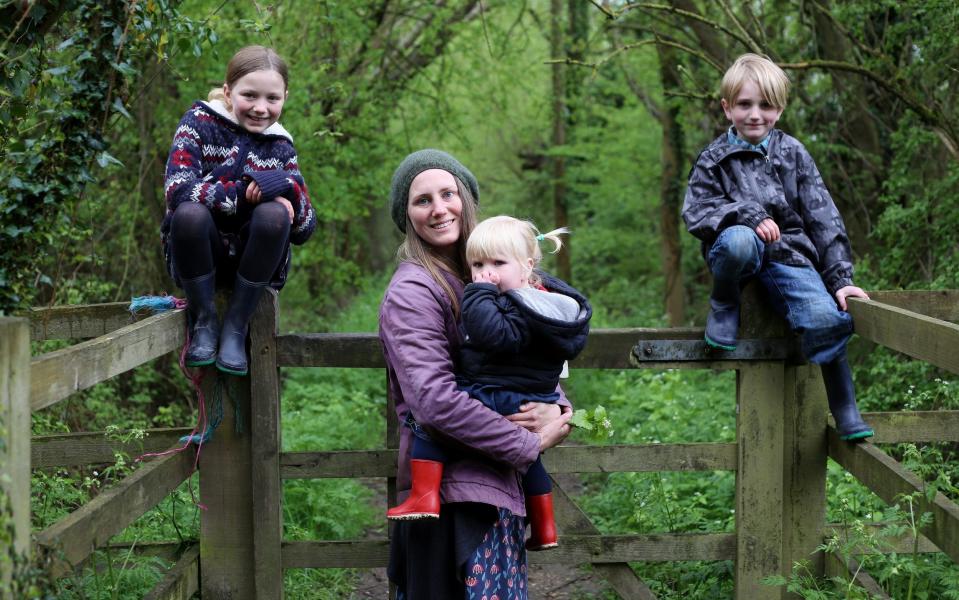Could mindfulness make you a better, calmer parent?

It's all very well trying to remain calm as a parent, but when you have a baby who has thrown porridge all over you, a three-year-old whacking you all with a toy tractor, a six-year-old who refuses to dress for school, and two minutes to get everyone out of the house, how can anyone channel their inner Zen in moments like these?
According to Veronique Ryan, who trained as a GP in her native France and now advises on healing, it's not as impossible as it sounds. "Being more mindful, focusing on the present moment, can benefit everyone. It's not just for gurus," she insists. "Mindfulness is a way of tapping into that feeling of calm and happiness, one breath at a time." The practice of remaining in the now is very much of the now: mindfulness is being used to treat insomnia, addiction, obesity and much more. Books, apps and courses are mushrooming. Ryan, through her company Mindful Family, is one of a growing number of therapists teaching parents and families how to keep cool in the most stressful of situations.
The techniques have helped everyone from single parents to autistic children and wild teenagers - not to mention Ryan herself: she came to mindfulness after being ground down to exhaustion by the travails of raising four children. Meditation and mindfulness restored her equilibrium. Applying lessons from one of the greatest champions of mindfulness, Thich Nhat Hanh, the Vietnamese Buddhist scholar, Ryan even discovered inner peace at the unlikely locale of the kitchen sink. "When I washed the dishes, I would try to make it more mindful, zoning in on the sensations of the water. It made it joyful rather than resenting being the only one doing the washing up." She saw the effects in three weeks. "The children noticed how calm I felt, and there were fewer outbursts."

Given that you can set your watch by such outbursts in my home, I check in with Ryan for a private session. As a mother of three boisterous and, at times, utterly maddening young children, I am extremely sceptical of any parent who claims to keep their calm all of the time. But given that some mindfulness techniques have been backed by scientific research from Stanford University and have been put into practice by the US military in hostage situations, it might just make the difference on the domestic battlefield.
Resting one hand on my heart, Ryan asks me to focus all of my attention there and imagine my breath flowing in and out of the space around it. Then visualise a place where I have felt gratitude and happiness. I bring myself back to floating downriver on a raft in Thailand 20 years ago, without any burden of responsibility. "Connect to that place, breathe deeply." The effect is instantly calming. I feel lighter, and the tight knots in my shoulders loosen palpably. She recommends trying to tune into that feeling in moments of stress.
Mindfulness has changed me as a parent, made me feel calmer and more empowered
The effect doesn't last long, however. It's one thing feeling calm in the therapist's low-lit, book-lined room with only your own thoughts for company, but it's another to achieve that in a scrum of children.
"Mindfulness requires practice," says Ryan. "Parents have come to me with a troubled child and expect a miracle pill, but it doesn't work that way." She suggests carving out 15 minutes a day for the "quick coherence" practice we tried today. "You will notice the effects after a few weeks if you commit."
Another tip is "seven-11" breathing: inhaling for seven seconds and exhaling for 11. "Elongating the breath is instantly calming, like pressing the reset button when you're under pressure."
Amber Hatch, a 35-year-old mother of three from Oxford, regularly taps into mindfulness in moments of pressure. She has written Mindfulness for Parents (Watkins), as a guide to staying calm in a family crisis. For Hatch, the light-bulb moment came during the throes of childbirth. "Breathing slowly and purposefully allowed me to feel the contractions in a way that was still scary but no longer excruciating. It was the moment I came to realise the tremendous power of mindfulness. With little experience of meditation, I knew that letting go was powerful enough to wipe away the agony of birth pains."

Mindfulness can be cultivated with practice, she believes. "Make it a habit every day. When your mind wanders, bring it back to the task at hand. Every time it slips away, bring it back again." She even uses the screams of her toddler as a reminder to be more mindful.
So does a published expert on keeping cool never get cross with her own children? "I do," Hatch admits, "but the more I can bring up mindfulness - focusing on the breath, for example - the more I can react calmly. Sometimes I might think of a horrible retort, but I can catch it before saying it."
But aren't we in danger in letting our children get away with it if we never show our anger? "Mindful parenting isn't permissive parenting; children still need boundaries and you can still be strict," says Hatch. "Mindfulness is simply a tool. It has changed me as a parent, made me feel calmer and more empowered. It allows you to be the parent you want to be."
Strip away the buzzwords and it is a fairly simple concept: keep calm and take things one breath at a time. Good advice, of course. Just try to remember it when the next bowl of half-eaten porridge is hurled your way.

